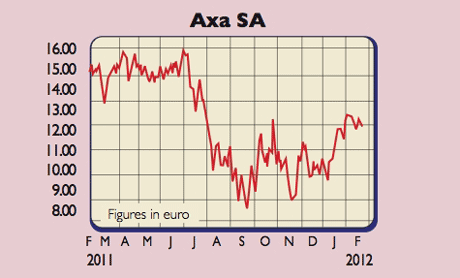Get the latest financial news, insights and expert analysis from our award-winning MoneyWeek team, to help you understand what really matters when it comes to your finances.
You are now subscribed
Your newsletter sign-up was successful
Want to add more newsletters?

Twice daily
MoneyWeek
Get the latest financial news, insights and expert analysis from our award-winning MoneyWeek team, to help you understand what really matters when it comes to your finances.

Four times a week
Look After My Bills
Sign up to our free money-saving newsletter, filled with the latest news and expert advice to help you find the best tips and deals for managing your bills. Start saving today!
Insurers suffered on all sides last year as sovereign bonds had to be written down, catastrophe claims (such as those from the Japanese earthquake) emptied coffers, and Europe's austerity measures cut demand for savings products. Worse, rock-bottom interest rates forced many to slash guaranteed returns on popular investment policies, exposing them to stiff competition from banks.
Axa, Europe's second-largest insurer, was no exception. It was knocked by a bigger-than-expected €387m write-down on its holdings of distressed Greek debt that's a 78% haircut. Its economic solvency ratio also dropped from 178% to 148% as of the end of December.
However, the dividend was held at €0.69 twice covered by earnings. Better still, Axa's €1.9bn and €1.3bn disposals of its Canadian and Australian units mean that it has more than enough firepower to scale up its fast-growing Asian interests (13% of profits). So far, the cash has been used to reduce the debt to equity ratio to a comfortable 26%, equivalent to interest cover (profits as a multiple of interest) of 9.1 times.
MoneyWeek
Subscribe to MoneyWeek today and get your first six magazine issues absolutely FREE

Sign up to Money Morning
Don't miss the latest investment and personal finances news, market analysis, plus money-saving tips with our free twice-daily newsletter
Don't miss the latest investment and personal finances news, market analysis, plus money-saving tips with our free twice-daily newsletter
Another bright spot was in home and car insurance, where less well-financed rivals retrenched, freeing bigger operators to charge more. This trend has seen Axa continue to win ground from the industry's mid-market players.
Axa SA (Euronext: CS), rated a STRONG BUY by Raymond James.

Analysts have pencilled in 2012 turnover and underlying earnings per share of €86bn and €1.69 respectively, rising to €88bn and €1.88 in 2013.
So the stock trades on price/earnings (p/e) ratios of 7.5 and 6.7, with a 5.5% yield. CEO Henri de Castries believes Axa can achieve a 15% return on capital over the cycle, which compares favourably to today's 10%. If he's right, then the company is easily worth 1.2 times its book value, or €16.20 a share.
Like most of its peers, the group is exposed to the risk of poor investment returns, natural disasters and increasing longevity. Its asset book contains loans to Italy (€16.1bn), Spain (€8.5bn), Portugal (€2bn) and Ireland (€1.1bn), but that's from a total bond portfolio of €384bn. So Axa looks like one of the safest bets in the sector. Investment bank Raymond James has a price target of €18.30, and first quarter results are due out on 11 May.
Rating: BUY at €12.50
Paul Hill also writes a weekly share-tipping newsletter, Precision Guided Investments. See www.moneyweek.com/PGI or phone 020-7633 3634 for more.
Get the latest financial news, insights and expert analysis from our award-winning MoneyWeek team, to help you understand what really matters when it comes to your finances.
Paul gained a degree in electrical engineering and went on to qualify as a chartered management accountant. He has extensive corporate finance and investment experience and is a member of the Securities Institute.
Over the past 16 years Paul has held top-level financial management and M&A roles for blue-chip companies such as O2, GKN and Unilever. He is now director of his own capital investment and consultancy firm, PMH Capital Limited.
Paul is an expert at analysing companies in new, fast-growing markets, and is an extremely shrewd stock-picker.
-
 Should you buy an active ETF?
Should you buy an active ETF?ETFs are often mischaracterised as passive products, but they can be a convenient way to add active management to your portfolio
-
 Power up your pension before 5 April – easy ways to save before the tax year end
Power up your pension before 5 April – easy ways to save before the tax year endWith the end of the tax year looming, pension savers currently have a window to review and maximise what’s going into their retirement funds – we look at how